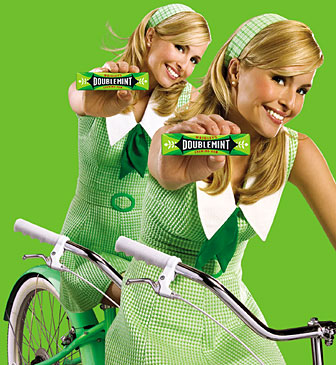 Yes! Today you get not one but two awesome Romanian words explained, thus doubling your pleasure!
Yes! Today you get not one but two awesome Romanian words explained, thus doubling your pleasure!
The first one is a common phrase: a freca menta.
You might recognize the word mentă because it comes from the same Latin root as in English, meaning “mint”, whether the savory plant or the flavor that we derive from it. The verb freca however means to “rub” or to “rub together”. Putting it all together it means “rubbing the mint”. But what does that mean?
Imagine you were rubbing a mint leaf in one hand between your thumb and forefinger. That’s a motion that in America we call “playing the world’s smallest violin”. In English we use it to sardonically imply that we don’t care. In Romanian however the gesture is more akin to “twiddling your thumbs” otherwise known as “doing nothing”, especially when you’re supposed to be doing something.
So if you see someone on the job who is supposed to be doing something but is standing around doing nothing. In Romanian you can say that they freca menta or are “rubbing mint”. This phrase doesn’t rise to the level of a “cuss word” but it is a somewhat vulgar thing to say and you would want to avoid this in very polite company.
Now it’s time for your bonus word!
And that word is: izmă (ease-muh).
A couple of weeks ago I was in the piata, buying some honey when the lady tried to sell me one kind of honey labeled izma. When she gave me a free taste of her delicious honey, I realized right away the bees had been pollinating none other than mint plants. Yes, izma is just a rather obscure Romanian word of unknown origin for the same plant normally called mentă.
Note: While a lot of English-speaking people put a great deal of stock in the difference between spearmint and peppermint, here in Romania all branches of the mint family are just referred to as mentă or izmă (in certain locations).
AND NOW YOU KNOW!

Actually, there is a difference between spearmint and peppermint in romanian: we call spearmint simply “menta” and for peppermint we use the expression “menta rece” (cold mint). So you know ;)
LikeLike
I you wanna learn more check out this one http://www.mintrubbing.org/.
LikeLike
@ Suzana: aghiazma e făcută cu busuioc din cate știu
izmă => din limba dacă?
LikeLike
@ Daniel: “izmă” provine din limba greacă (vezi mai sus)
LikeLike
Ai dreptate, am facut o mare confuzie – scuze!! Mi-am amintit seara tarziu si chiar de asta am revenit aici sa rectific (si sa vad cine m-a tras de urechi). Deci am spus o tampenie aghiazma cu izma n-au nicio legatura. (Ma rog, cine vrea poate sa-si puna si menta in apa sfintita daca doreste:)
LikeLike
in “ou can say that they freca menta” should be “freacă menta”; “a freca menta” is the infinitive, “freacă menta” is the present tense
LikeLike
Habar n-am de ce dar am facut o conexiune intre cuvantul izma si “aghiazma”. Aghiazma inseamna apa sfintita, denumire folosita mai mult in Ardeal. Din cate imi amintesc eu mama sau bunica venea de la biserica cu o sticluta cu apa sfintita in care era pusa o ramurica uscata de izma (menta) -poate de la asta – “aqua plus izma” – adica apa cu menta/izma s-a nascut cuvantul “aghiazma”?!
LikeLike
“Aghiazmă” sau “agheasmă” îşi are originea în greaca veche: “aghiazo” (a sfinţi).
LikeLike
By the way, check out DICŢIONARU LIMBIǏ ROMÂNEŞTǏ by AŬGUST SCRIBAN, page 664.
LikeLike
According to August Scriban’s “Romanian language dictionary” (Iaşi, 1939), the word “izmă” is of Greek origin. The Old Greek language has edýosmon, from edýs (pleasant) and osmé (smell). Variants: gýosmos, dýosmos (NeoGreek), dhïozmă (Albanian), gïózum, gïúzum (Bulgarian).
AND NOW YOU KNOW!
LikeLike